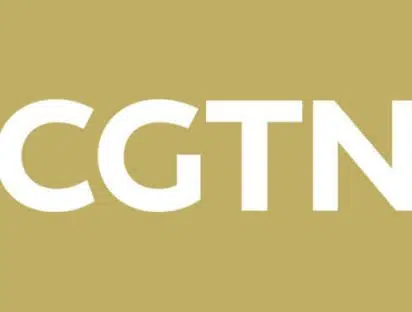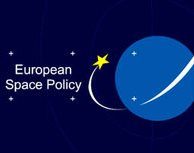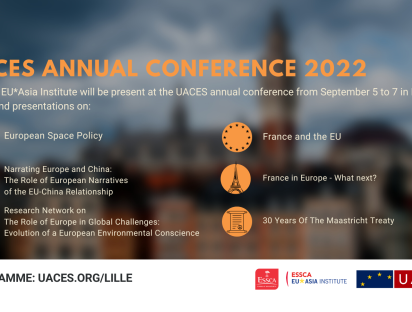A multidisciplinary research seminar at the ESSCA Paris campus.
Jean Monnet had several careers. Before his twenties already, he started as international sales representative of his father’s Cognac distillerie. This activity, which made him literally travel around the globe, made him understand, as he said years later, just how big and diverse the world was. Later, in his forties, his professional activity in the international investment business sent him to Shanghai, where he had puzzling and enriching encounters with the Chinese cultures, but also with leaders like Chiang Kai-shek. Still today, the decoration of the dinner room in his house in Houjarray bears remembrance to his Shanghai years. Finally, from the Second World War to his death n 1979, he was the tireless advocate of European unity, always convinced that people and political leaders are perfectly capable of identifying « the common interest ».
In an almost amusing coincidence, these three careers provided the common thread through the EU-Asia Institute’s research seminar on 23 March 2017 at the ESSCA Paris campus in Boulogne-Billancourt.
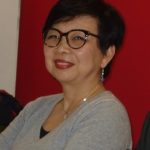
Lingfang Song spoke on Cognac consumption patterns.
The journey started in Cognac, with Lingfang Song‘s research about the behaviour patterns of Cognac consumers in China and the United States (the two most important markets). Lingfang presented highly interesting data from a survey that highlighted the differences between perceptions of the famous French brand name and the respective motivations for purchase among customers. It was highly interesting to observe the striking cultural differences between Chinese and American consumers in almost every aspect and learn about the managerial implications of the research, especially when it comes to marketing in two very different cultural contexts (emphasis on country-of-origin vs. luxury reputation, conspicuous consumption vs. hedonistic self-reward, or the use as expensive gift vs. the expression of cool cosmopolitanism). Not surprising that the presentation triggered a very lively discussion among the audience.
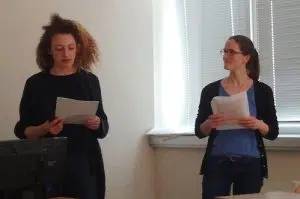
Aël Théry and Hélène Le Bail reporting on their field work amongst French cooks in Shanghai.
The report on their ongoing research project about elite migration to China made Hélène Le Bail and Aël Théry focus on the Shanghai microcosm of French cuisine. Their ethnographic field work explored the evolution of a previously privileged professional niche for what they referred to as « white migrants ». Hélène and Aël were able to demonstrate that the ethno-cultural capital with which French cooks were traditionally endowed progressively gave way to a purely professional capital based on acquired know-how and expertise, as well as a certain work ethos, which several informants described as « passion, rigour and discipline ». This capital, however, can be entirely assimilated by locals, provided they are willing to undergo the initiation to the French rules. Again, there was a lively discussion (especially as everybody in the audience had their own experience to share). The research work is part of a larger transnational project on China as a destination of migration. Unfortunately we have no research evidence about the restaurants that Jean Monnet frequented during his time in the French concession in Shanghai, but given his spending habits in what is today called « travel and subsistence », they are very likely to have been high-end venues…
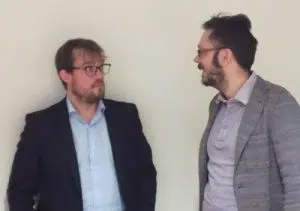
Miguel Otero Iglesias in discussion with David Ranc.
Miguel Otero Iglesias spoke about the big geopolitical picture of EU-China relations, sharing the current findings of the network of European Think-Tanks on China (ETNC) he is the founder and coordinator of. In his words, « Europe is increasingly facing what can be called THE BIG CHINA CHALLENGE », and slowly realising that fragmentation, both in its researchers knowledge about China and in its member-states’ relations with the world’s new superpower, may not be the best attitude to adopt and will need to be overcome. New topics like the need (or not) of a European screening body for corporate takeovers of European companies by Chinese investors start to make it to the top of the agenda. Another issue is of course the enforcement of reciprocity when it comes to market access in China, which seems to be toughening by the minute. The discussion following Miguel’s brilliant exposé focused on the eternal question whether the glass was half empty or half full when speaking about the EU’s capacity to stand up in unity to the challenge. If Jean Monnet was still alive, he would no doubt have taken an optimistic stance: it’s in times of crisis that leaders understand the need to identify the common denominators of their interest.
From to Cognac to Brussels via Shanghai, the fascinating work presented at this Research Seminar gave evidence to the currency and importance of EU-China relations, be they commercial, cultural, economic or political. In bringing together very different approaches it also highlighted the added value of interdisciplinary research in this field. And it showed that good research has the power to trigger passionate discussions. After three hours and a half of presentations and debate, Thomas Hoerber had to impose the closing of the meeting, just to make sure nobody would miss their trains or flights.
The next Research Seminar of the EU-Asia Institute is scheduled for 3 April, with a focus on Social and Solidarity-Based Economy.

